







 Lawrence Journal-World Advertising supplement sponsored by:
Lawrence Journal-World Advertising supplement sponsored by:









 Lawrence Journal-World Advertising supplement sponsored by:
Lawrence Journal-World Advertising supplement sponsored by:
President
Term: 2020-2023 785-330-1704 skimball@usd497.org

Term: 2020-2023
785-330-1707 psmith@usd497.org
Erica Hill


Past President
Term: 2020-2023 785-330-1709 ehill@usd497.org
I want to use this space to call our community’s attention to the Lawrence Board of Education’s 2023 Legislative Priorities. You may nd them at www.usd497.org/ LegislativePriorities.
The document begins by acknowledging that universal public education is the bedrock of our democracy and a fundamental right that does and should provide each child the opportunity to reach their potential. Our board, administration, teachers, and staff recognize the importance of making and supporting signi cant shifts in mindset and practice to provide and sustain equitable outcomes for ALL students.
This is key to our vision and mission. This is central to the promise of our community’s plan for school progress, our strategic plan. This is our moral and professional obligation. This is a call to action!
Other communities are not as fortunate. Their boards and communities do not support educational equity work. Their legislators vilify public schools.
One of the things that I have observed that Lawrence does well is advocate. We organize. We rally. Let’s take our energy to Topeka in January.



The Lawrence Board of Education meets at 6 p.m. on the second and fourth Mondays of each month, unless otherwise announced, at 110 McDonald Drive.
Upcoming Meetings:
November 22 • December 12
January 9 & 23 • February 13 & 27
March 27 • April 10 & 24
May 8 & 22 • June 12 & 26
• Review agendas at usd497.org/SchoolBoard.
Carole Cadue-Blackwood
Term: 2020-2023 785-330-1712 ccaduebl@usd497.org
Kay Emerson
Term: 2022-2025 785-330-1721 kay.emerson@usd497.org

Our team knows that we have more work to do and that equity work requires a sense of urgency. You will read about some of our efforts in this newsletter.
I have heard expectations of the upcoming legislative session described as a train wreck and an assault on public education. It does not and should not have to be this way.
By working together, we can advocate for solutions to the staff recruitment and retention crisis by closing wage gaps. The Board’s legislative priorities advocate raising the base state aid per pupil and fully funding special education at the required 92% of excess costs to make this possible.
Together, we can champion respect for the professional instructional expertise of educators. We must support our teachers in continuing to implement research-based best practices in their classrooms.
• Write to the board at SchoolBoard@usd497.org.
• Sign up to speak at PublicComment@usd497.org before 5 p.m. on the date of the meeting.
• Watch meetings on Midco channel 26 or at usd497.org/Webstream.
GR Gordon-Ross
Term: 2022-2024 785-330-1464 gr.gordon-ross@usd497.org
Douglas County is fortunate in many ways. Our community recognizes institutional biases in labor, retail, and housing markets, and education, law, health care, criminal justice, and political systems. Lawrence openly discusses these concerns and advocates changing them. Our Douglas County legislators, like the community they serve, value and support public education.
The “public” in public education re ects our partnership – schools, families, and community. Please continue to partner with us to tell the story of our dedicated educators serving the noblest of professions and committing every day to support every child’s needs, academic achievement, and personal success..
Sincerely, Anthony S. Lewis, Ph.D. Superintendent
Kelly Jones

Term: 2022-2025 785-330-1711 kelly.jones@usd497.org
Lawrence Public Schools 110 McDonald Drive Lawrence, KS 66044-1063 785-832-5000 www.usd497.org Facebook.com/LawrencePublicSchools
Anthony Lewis, Ph.D. Superintendent of Schools
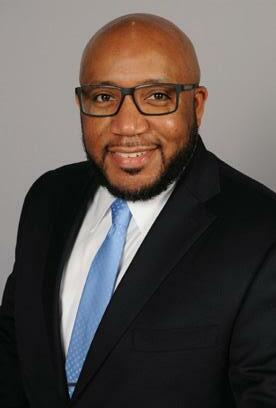
This newsletter produced by USD 497 Executive Director of Communications Julie Boyle and Multimedia Communications Specialist Emma Fotovich in partnership with the Lawrence Journal-World.
Lawrence Public Schools USD 497 is an equal opportunity employer and will not discriminate in its employment practices and policies. Discrimination against any individual on the basis of race, color, religion, sex, age, national

A Listening and Learning Tour in 2018 enabled school district leaders to hear from the community. Residents shared district strengths and challenges, and their ideas for school improvement. Using this input, the superintendent and school board worked with staff to develop a ve-year strategic plan. The plan re ects the community’s vision for the future of its public schools.

Lawrence Public Schools will ensure that students of all races, backgrounds, and abilities achieve at high levels, demonstrate profi ciency in reading by third grade and in math by eighth grade, and graduate on time prepared for success in college and careers.



































One area of the Lawrence Public Schools’ strategic plan focuses on a cohesive curriculum with objectives to identify what students should know and be able to do Pre-12+, and to use instructional resources that honor and preserve students’ diverse cultural backgrounds.




























“We want to make sure all students have access to consistent curriculum,” said Patrick Kelly, chief academic of cer. “Every content area is always in a state of review.”


The Curriculum, Instruction, and Assessment Team uses a multistep Curriculum Review Cycle. Staff review state standards, identify priority standards, develop, evaluate, and review curriculum; and evaluate instructional resources using
the district’s Culturally goals, and adjust instruction to
the district’s Culturally Sustainable Resource Criteria tool.
The Team also develops a plan of professional development to support effective teaching strategies and to align curriculum, instruction, and assessment. Building administrators and professional teaching staff review data, set goals, and adjust instruction to support student learning.
“The function of a rigorous curriculum is to raise the level of teaching so students are prepared with 21st-century skills,” said Denise Johnson, elementary curriculum director.
While balancing the time necessary for instruction, the district uses multiple assessments to track progress. Teachers use classroom assessments throughout the school year to gather evidence of student learning and guide adjustments in their instruction to meet student needs. The district works to align state and local assessments to better understand if students have had the opportunity to learn the required state standards, so they can demonstrate proficiency on the annual Kansas Assessment Program.
Find more information about district curriculum, instruction, and assessment at www.usd497.org/cia.
District and building administrators, teachers, and staff provide regular updates to the school board about each area of the strategic plan. The board also receives regular reports about Kansas Education Systems Accreditation (KESA), the state’s K-12 accreditation model.
The Kansas State Board of Education identified five goal areas believed to have direct impact on producing successful high school graduates. The KESA model focuses public schools on meeting these goals through redesign and continuous improvement. The five goal areas include:
1) Social-Emotional Factors Measured Locally, 2) Kindergarten Readiness, 3) Individual Plans of Study, 4) High School Graduation, 5) Postsecondary Success.


The district works with a Site Council and various advisory committees that advise the board and administration on identifying learning barriers, developing action steps, and establishing budget priorities.
Each school has a Building Leadership Team and Site Council that review data and establish Building Goals aligned to the district’s strategic plan. School staff meet in Professional Learning Communities to establish learning goals, review academic data, and identify interventions to meet
students’ academic needs and socialemotional and behavioral goals.
Staff use a Comprehensive, Integrated, and Three-Tiered Model of Prevention (Ci3T). It identifies academic, social-emotional, and behavioral expectations, responsibilities, and procedures for teaching, reinforcing, and monitoring student progress. Each school’s Ci3T Team leads this work.
The Kansas Legislature recently passed legislation requiring public school districts to conduct formal needs assessments for school boards to review prior to approving annual budgets. Find the district’s needs assessment and school building goals online at www.usd497.org/ SchoolImprovement.
Lawrence Board of Education Policy requires the board to approve the schedule for periodic curriculum review, including all additions, deletions, or major alterations to the curriculum.
Elementary students will have a new resource for English language arts (ELA) this year. The board last year approved the purchase of Benchmark Advance, to replace a discontinued resource, Reading Street. This K-5 ELA adoption followed a staff review of state guidance for supporting students with dyslexia, including using structured literacy instruction.
Structured literacy emphasizes the highly explicit and systematic teaching of all important components of literacy. These include foundational skills, such as decoding and spelling; and higher-level literacy skills, such as reading comprehension and written expression. Structured literacy also emphasizes oral language abilities essential to literacy development. These include phonemic awareness, sensitivity to speech sounds in oral language, and the ability to manipulate those sounds.
The review process that led to the purchase of the new ELA resource included a committee evaluation of 14 resources, a pilot of three resources by 18 teachers across three grade levels, and a district cost-benefit analysis. The board purchased Benchmark Advance on a six-year contract for $882,900 from the Student Materials Revolving Fund, supported by student fees.
In the spring of 2021, the district created a Social-Emotional Curriculum Review Team to begin the multistep process of researching, selecting, piloting, and ultimately, recommending to the board the purchase of a new social and emotional learning resource for K-12 students. Teachers and students across all grades, including Lawrence Virtual School classes, continue to use and review Character Strong. Some elementary classes pilot Second Step while select secondary classes explore the use of EduGuide. The administration expects to bring a recommendation to the board in the spring.
Social and Emotional Learning teaches concepts, such as selfawareness, self-management, social awareness, relationship skills, and responsible decisionmaking. Instruction also focuses on supporting students in developing skills, such as emotion regulation, and character traits, such as respect and responsibility. Ask your student what skills they have practiced at school.
Lawrence Public Schools has more work to do to meet its strategic plan promise to ensure that students of all races, backgrounds, and abilities achieve at high levels, demonstrate proficiency in reading by third grade and in math by eighth grade, and graduate on time prepared for success in college and careers. By analyzing student achievement data, including annual state assessments and first-quarter district interim assessments; student attendance records, and student behavior reports and screening data, our school community has a renewed focus, and a sense of urgency, toward our continued work with students, families, and community partners around school improvement.
Centering Educational Equity Executive Director of Inclusion, Engagement, and Belonging Dr. Cynthia Johnson said that using the school board’s Equity Policy as a guidepost, each school will center educational equity by implementing a Closing the Access, Opportunity, and Achievement Gap Framework. She says that the framework focuses on seven essential questions requiring action:
1) What does the data show about how we are educating marginalized populations? 2) Who are the marginalized students in your school (by name, race, grade, parent/ guardian)? 3) What does the data show about the achievement of each marginalized student? 4) What does the data show about the attendance rate of each marginalized student?
5) What does the data show about the behavior of each marginalized student? 6) What instructional changes are necessary to improve the learning of each marginalized student? 7) What supports are necessary to promote healthy development and excitement about learning to move our marginalized students?



Board Policy defines Educational Equity as “When educational policies, practices, interactions, and resources are representative of, constructed by, and responsive to all people so that each individual has access to meaningfully participates in, and has positive outcomes from high-quality learning experiences, regardless of individual characteristics and group membership (Fraser, 2008, Great Lakes Equity Center, 2012, p.2).”
Johnson said that school principals, Equity Teams, and Building Leadership Teams will respond to the framework’s seven essential questions and lead necessary changes and adjustments within their schools. Building Support Teams observe and collect data during regular school visits with principals, and district and building administrators and Building Leadership Teams monitor progress during building goal check-ins.

The Kansas State Department of Education (KSDE) used longitudinal data to determine that students performing in the top half of Level 2 or higher on the Kansas Assessment Program (KAP) graduate and achieve postsecondary success. It uses KAP Performance Level Descriptors to indicate whether a student shows a Level 1 - limited, Level 2 - basic, Level 3 - effective, or Level 4 – excellent ability to understand and use the skills and knowledge needed for postsecondary readiness.
Of the Lawrence students that participated in the KAP in 2021-2022, 54.1% and 47.3% scored at the top of Level 2 or higher in English language arts and math, respectively. Identified subgroups comprised of Students with Disabilities, English Language Learners, Students of Color, and Students Qualifying for Free/ReducedPrice Lunches were disproportionately represented at Levels 1 and 2.
“It is important to not only look at the achievement gap, but also the access and opportunity gaps by
looking at disproportionalities. I believe that we have the power to lift every single student to another level,” said Johnson.
USD 497’s Director of Data and Assessment, Dr. Jana Craig-Hare, said that the district started using interim assessments aligned with state curriculum standards this year to help predict students’ future performance on the KAP. The results of these formative assessments inform educators’ instructional decisions by enabling the evaluation of students’ knowledge and skills relative to a specific set of academic goals. Schools began sharing interim assessment reports with families during conferences last month.
Last month Craig-Hare reported to the board additional data illustrating barriers to student learning, including
chronic absenteeism and student behavior/disciplinary incidents during the first quarter of the school year. These include:
• 92.5%: Average Daily Attendance
• 24.7%: Rate of Chronic Absenteeism, defined as missing 10% or more of school days for any reason
• 1,018: Student Behavior/ Discipline Incidents (492 students)

• 155: In-School Suspensions (137 students)
• 318: Out-of-School Suspensions (231 students)
• 612: Student Behavior Incidents Involving the use of Restorative Practices
• 38.2%: Percent of Behavior Incidents in which Restorative Practices Prevented Suspensions.
“Our learning issues primarily are from students missing foundational
skills,” said Lead Elementary Principal Jackie Mickel of Langston Hughes school. She cited among changes in practice needed: structured literacy, continual and rigorous professional development, high quality Tier 1 (foundational) instruction for all students, scheduled intervention blocks, and supports to promote students’ healthy development and school connectedness.
Lead and West Middle School Principal Dr. Quentin Rials said that the data shows a need for the district’s equity work to continue and remain a priority. “We don’t want to lower the bar. We want to keep that bar high and scaffold our instruction. We need to make sure we take ‘temperature checks,’ so we don’t get all the way through a unit before finding out students aren’t successful. If we don’t know where kids are, we don’t know how to help them,” he said.
Speaking on behalf of the high schools, College and Career Center/ Academy and Lead Principal Dr. Bill DeWitt said that schools have begun sharing assessment data with student affinity groups, such as Black Student Union, Latin American Studies Student Organization, and InterTribal Club. The high schools also are reaching out to school families to discuss barriers to student learning.
Superintendent Dr. Anthony Lewis said that Lawrence Public Schools is fortunate, noting that many school districts in Kansas and around the country cannot engage in this (equity) work because their boards and/or communities do not support it. “We have some things in place that I really believe will move the needle. We have to focus on moving all students up,” he said.
Safety: a Shared Responsibility
Knowing that families had safety top of mind during back-to-school time, Lawrence Public Schools collaborated with local partners to present a series of six community safety forums in August. “Safety is a shared responsibility,” said Dr. Cynthia Johnson, the district’s executive director of inclusion, engagement, and belonging, as she set the tone for each forum.
Superintendent Dr. Anthony Lewis explained that when the district was developing its strategic plan, students asked that it emphasize safety. Their input led to one of the plan’s five focus areas: Safe and Supportive Schools.

Watch a recording of one of the Community Safety Forums at www. usd497.org/Webstream.
In 2019, after Lawrence high schools managed three student weapon-possession incidents in two weeks, the district hosted a Community Conversation about Safety. More than 350 people attended to discuss and share feedback. These conversations emphasized the critical role strong relationships play in maintaining safe learning environments.
Safe schools research published by the U.S. Departments of Homeland Security and Education and the U.S. Secret Service also recommends developing trusting relationships, respectful communication, and strong connections with students.
Lawrence school staff prioritize relationship-building and work to ensure that every student can identify at least one caring adult at school
that they trust and with whom they feel comfortable and can talk.
Each Lawrence school has a mental
health team made up of counselors, social workers, psychologists, nurses, and other professionals. Through a 25-year partnership with Bert Nash Community Mental Health Center and its Working to Recognize

Alternative Possibilities program, WRAP therapists work in schools to support student and family needs.
Teachers use a comprehensive, integrated, and three-tiered model
of prevention called Ci3T to meet the individual needs of students. All students receive (Tier 1) academic, social, emotional, and behavioral support, including social-emotional skill instruction. If students need more assistance with building a specific skill, such as coping skills, they may work in smaller groups with a member of the mental health team (Tier 2). If a student needs intensive, individualized support, they may work one-on-one with a mental health professional (Tier 3).
When student behaviors disrupt learning, staff may use restorative practices, a relationship-focused way to address conflict and promote collaborative problem-solving among students and staff. Through restorative practices, staff guide students in repairing harm between students or between students and staff.
“We have staff, training, and tools in place to keep our students safe,” said Jose Cornejo, a school social worker

and the facilitator of the district’s crisis support team. “Any time a parent has concerns about their child or another child, we ask that they please reach out to their child’s teacher, principal, or counselor.”
Schools encourage open communication between home and school. Staff asks that parents report safety concerns and encourage their children to do the same. They also request families keep their contact information updated with their child’s schools, so staff can always reach them.
The district provides all staff with annual ALICE critical violent incident training. This training teaches situational awareness and five strategies: Alert, Lockdown, Inform, Counter, and Evacuate. Anyone can use ALICE strategies for protection, as any situation warrants.
Staff share ALICE strategies in developmentally appropriate ways
with students. They practice them during emergency drills. ALICE provides an online module for parents and others interested in learning more about its training. Find the ALICE Learning Module for Parents and Community at www. usd497.org/Safety.


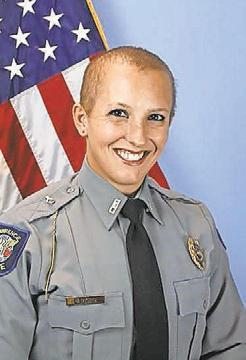

Emphasizing community-oriented policing and proactive problem solving, the City of Lawrence and the Lawrence Police Department recently expanded from four to six the number of school resource officers (SROs) assigned to schools. The department has assigned one SRO to each middle and high school. They also assist elementary schools when necessary.

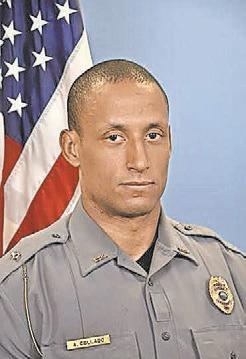
Lawrence SROs complete an intensive certification process. They receive comprehensive training, including National Association of School Resource Officers, biasfree policing, conflict resolution, crisis planning, threat assessment, active threat response, emergency management, adolescent mental health, social media trends, and mentoring, among other training. The district includes SROs in its Courageous Conversations about Race and ALICE training.
During the August Community Safety Forums, the SROs talked about their roles and responsibilities.
“We do not enforce school rules and policies or enforce discipline,” said SRO James Browning, who works at Billy Mills Middle School. “What we don’t want to do is to take the kids in our schools and introduce them into the judicial system. We mentor, and we guide. We follow up and build relationships with kids.”
“My greatest source of pride as an SRO is the relationship I have with every kid within the school and with the members of the district… because safety is a shared responsibility. We are all stakeholders. We are in the business of public safety. We just get the pleasure of doing it around your children,” said SRO Amaury Collado, who works at Lawrence High School.

Superintendent Lewis served on the Kansas Governor’s Commission on Racial Equity and Justice, a group that studied and made recommendations
about SRO programs and Kansas policing. Its recommendations included exploring alternatives to SROs, such as school counselors; and requiring officers to complete implicit bias training. Both of these are in place locally.
“From what I’ve heard and observed, it’s an asset for ensuring that our schools are safe for our students to learn,” said Erica Hill, school board past-president, of the Lawrence SRO program.
The district will re-evaluate the SRO program in the spring, as it did in 2019 and 2021, including surveying students, parents, and staff about it and school safety.
In addition to its SRO partnership, the Lawrence Police Department recently began using the Handle with Care Program to provide additional support to students exposed to trauma. When law enforcement officers respond to a traumatic event involving a child, they notify a teacher or counselor at the child’s school to “handle the student with care.” This helps school staff know to keep a close eye on the student and prepare to provide extra support services as needed.
A global pandemic followed by a nationwide labor shortage has made it difficult for Lawrence Public Schools to achieve its recruitment and retention goals. The district’s strategic plan includes a focus on Effective Employees and the objectives of creating a positive and supportive work environment and supporting the success and wellbeing of every employee.
A former teacher and principal, Kristen Ryan, now the district’s executive director of human resources, said that her staff looks at fall and spring climate surveys and employee stay and exit surveys to glean data about employee retention. “Retention is the new recruitment,” said Ryan of the challenge in finding candidates for vacancies.
She shared that of 150 certified teachers leaving the district last May, 86 completed an exit survey. Most had less than 10 years of experience and worked at either the elementary or middle school level. Selecting from a list of general reasons for leaving, most respondents selected salary,
work-to-life balance, relocation, and retirement. Others cited district support, professional workload, and administrative leadership.
Teachers exiting also expressed dissatisfaction with salary and benefits, educator-to-administrative collaboration, meetings, work processes, and decision-making; over-testing, increases in class sizes, large caseloads, and lack of training with curriculum changes. On the flip side, they indicated satisfaction with technology and human resources support, a team atmosphere, the work calendar; and at the building level, having their voices heard, clear expectations, and sufficient feedback.
Teachers leaving the district could select more than one response about their plans. They indicated they planned to take another position in education (51) or outside of education (16), return to school (5), stay at home (6), retire (18), or consider other options (18). When asked what new positions offered that their current positions did not, respondents listed higher salaries,

smaller class sizes, more stable leadership, more support staff and resources, location closer to home, relocation, and more opportunities to grow.
Board President Shannon Kimball expressed frustration that voters and lawmakers do not always understand that when public schools ask for more money, they are asking for funding to recruit and retain highquality staff.
“Districts cannot substantially increase the pay of their teachers or substantially decrease class sizes and caseloads without more funding from the state in the base state aid per pupil formula,” said Kimball. “It is just not going to happen. There is no amount of moving around the deck chairs that is going to be enough to close a 25% gap between what a teacher with a bachelor’s degree makes in the teaching profession versus somebody with a bachelor’s degree in private industry.”
Human resources staff shared that their recruitment and retention
efforts include highlighting employee health and wellness benefits, expanding university partnerships, and increasing training and professional development. Others include using contracted services to bridge gaps, providing learning coaches, improving school climate and culture, and supporting co-teaching. The district used federal COVID-19 relief funds to provide retention incentive payments of up to $4,500 over two years to all eligible staff and an Early Childhood Benefit Program for the preschoolaged children of classified support staff.
Superintendent Dr. Anthony Lewis asked for the community’s help in this area. “How we talk about our district and the teaching profession impacts our efforts to recruit and retain the best staff to serve and support our community’s children,” he said, adding that word-of-mouth is a powerful recruiter.
Go to www.usd497.org/Apply to join the Lawrence Public Schools Team.


With few candidates applying for open positions, Lawrence Public Schools had to get creative with its approach to recruiting and retaining classified support staff. Superintendent Dr. Anthony Lewis announced in August that the district would use federal Elementary and Secondary School Emergency Relief (ESSER) funds to support an Early Childhood Classified Benefit Program. This program provides free early childhood educational services and before- and after-school enrichment for the preschool-aged children of classified employees. Classified staff work as paraeducators and instructional support staff, food service and custodial personnel, and secretarial, clerical, and technical services staff in the school district.
The Early Childhood Benefit Program began providing early learning opportunities for three-and four-year-old children of classified
staff on September 6. Lewis hopes that this benefit also will support the recruitment of new candidates for vacant classified positions.
“Our community needs to look at more creative approaches like this to expand high-quality early childhood educational opportunities and recruit and retain employees,” said Lewis. “This should be a significant benefit to classified staff working in our schools. They will know that while they are at work, their young children will be building kindergarten readiness skills and receiving two nutritious meals in a
safe and nurturing environment.”

The district included $955,000 in its ESSER III application to support two certified teachers, an enrichment coach, and four instructional paraeducators for two additional early childhood classrooms at Kennedy Early Childhood Center. ESSER funds also supported the purchase of curriculum and classroom furniture, supplies, and materials for the program.
Due to federal limitations on when ESSER funds must be used, the district will offer this benefit to new
and existing classified staff through the 2023-2024 school year, unless it finds a permanent source of funding to continue the program.
‘We want to be innovative in our approach by looking at barriers to individuals entering the workforce or maintaining a classified position in our district, as well as remove barriers to preschool-aged children receiving high-quality early childhood education,” Lewis said.
The benefit program operates 8:00 a.m.-3:00 p.m. Mondays, Tuesdays, Thursdays, and Fridays. The district provides enrichment before and after school on each those days from 7:00-8:00 a.m. and 3:00-4:30 p.m. On Wednesdays, when children in Kennedy’s other early childhood classrooms are out of school, the Early Childhood Classified Benefit Program operates from 7:00 a.m.4:30 p.m.


• Complete care for infants, children, and adolescents

• Neonatal care, including breastfeeding education and support with our certified lactation educator
• Routine well child care

• Preventive care and immunizations
• Treatment of childhood illnesses and injuries
• Developmental screening, vision, and hearing testing
Lawrence Pediatrics, PA


3310 Clinton Parkway Ct Lawrence, KS 66047
Phone: 785.856.9090
Remember your asthma or allergies should not interfere with work, school, activities, or sleep.
Ronald Weiner, MD Warren Frick, MD Board Certified
4601 W 6th St., Ste B, Lawrence, KS (785) 842-3778
www.asthma-allergy-kansas.com



Thanks to the generosity of district staff and community donors, the Lawrence Schools Foundation annually presents scholarships, grants, and awards to students, teachers, and staff in Lawrence Public Schools. Each fall, and again in the spring, the Foundation recognizes two support staff members with its Acknowledging Classified Employees or A.C.E. Awards.

Both of this fall’s awards honored administrative assistants who work in their school’s office and play a critical role in the success of their school communities.
Foundation Executive Director Dena Johnston presented A.C.E. Awards and $500 each to Brenna Lane at Sunset Hill Elementary and Michelle Hindman at Hillcrest Elementary School.

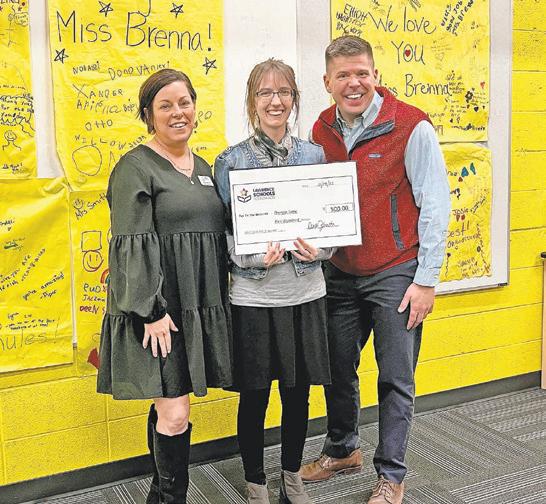
Students and staff made posters celebrating Lane, whose colleagues submitted nominations on her behalf. One nomination said, “Her kind, caring demeanor welcomes all and sets the tone for a positive day at Sunset Hill. For example, students who may arrive after an appointment or after a rough morning are greeted with a warm and understanding hello. I have seen students transform in an instant from the kind words shared by Ms. Brenna.”

At Hillcrest, staff sing the praises of Hindman. A colleague wrote that Hindman is fluent in Spanish and serves as an interpreter for some of Hillcrest’s students and families. “She understands the diverse economic background of our families and advocates for them at every opportunity,” the letter stated.
A warm environment for students to become curious, confident humans and engage with learning in a variety of different ways. That’s how Julia Ferguson describes the classroom she creates for her fourth and fifth graders. School families and colleagues agree that her classroom community at Quail Run Elementary inspires students to learn.
Superintendent Dr. Anthony Lewis presented Ferguson with the Lawrence Elementary Horizon Award to recognize her exemplary teaching in only her second year in the profession.
Quail Run Principal James Polk said that Ferguson creates a welcoming environment, meaningful lessons aligned to state standards, and pushes for excellence.
West Middle School student


Sophie Dietze said that any child would be lucky to have Tori Mitchell as their teacher because she has a wonderful sense of humor, is unbelievably patient, and she trusts students and makes them feel valued.
Lewis honored Mitchell with the Lawrence Secondary Horizon Award and nominated her and Ferguson to the Kansas Horizon Award program.
“Ms. Mitchell is an outstanding novice teacher, and an even better human being,” said West Assistant Principal Therese Brink Edgecomb. “Walk the halls of West and ask any student who interacts with her, and it will be clear that Ms. Mitchell builds relationships with kids in a fantastic way.”

Truity Credit Union rewarded Ferguson and Mitchell with $500 each.
940 New Hampshire St. Lawrence, KS 66044
785-843-2787
R E D B Y
The Lawrence Board of Education continues to engage the community in its ongoing work to ensure the fiscal health of the school district by balancing student needs and other priorities with available, and limited, resources.
“It is really important for us to put the district in a longterm financial position of operating within our means,” said Board President Shannon Kimball.
The board last spring approved $6.4 million in budget reductions in staffing and programs. This bridged a financial shortfall due largely to declining enrollment and corresponding losses in state aid. The cuts also enabled the board to reallocate funds to staff raises, increased operational costs, and its plan to begin to replenish contingency or emergency funds.
In August, the board contracted with consultant RSP and Associates to provide enrollment, development, and housing analyses, and facility utilization and enrollment projections. RSP Founder and CEO Rob Schwarz and his associates continue to facilitate a Futures Planning Community Engagement Process. This six-month process began in September. (See Timeline.)

After inviting public applications, the district appointed a Futures Planning Committee of 50% students, parents, and community volunteers and 50% school


and district staff. This group began its work by reviewing the board’s equity policy and learning more about the Kansas school finance system and the district’s budget, teaching and learning goals, and facilities. In addition to committee meetings, the process includes board updates, public input sessions, and a community survey. It will conclude in February 2023 with the Committee’s prioritized list of recommendations for the board.
“We have already decided that to keep doing what we are doing is not going to get us there,” said Kimball of reaching strategic goals, improving student outcomes, and supporting better staff wages. “This group really needs to be focused on what has to change, and how.”
“It would be important to demonstrate to the community how we might better use the buildings we currently have or if we made a decision to reduce the number of buildings we have, how boundaries might look,” said Kelly Jones, board member.
The board approved a 2022-2023 maximum budget authority of $185,937,389 in September, setting the mill levy at 51.776 mills, down from 53.122 mills in 2020-2021. Due to increases in local assessed valuation, taxes levied will be higher. School budget maximums ensure ample authority. They do not represent expected spending.
The board advocates that the Kansas Legislature increase the base state aid per pupil for public schools, currently $4,846. Kimball said that is the only way for the district to overcome barriers to recruitment and retention of highly qualified staff, reduce class sizes, and meet the growing needs of students.
Congratulations to Free State High (FSHS) sophomore tennis player Kinley VanPelt, the singles Kansas Class 6A State Champion, completing her season with an undefeated record of 29-0. Junior Maya Lee finished seventh in the singles state contest.
The district named Melissa Blevins, Sunflower, and Becky Reaver, Cordley, Principals of the Month for August and September after receiving several nominations from staff and parents lauding their leadership and many strengths.
Representatives from nine art schools attended Portfolio Day, giving LHS art students feedback on their portfolios and information about college programs and careers in the arts.

Lawrence Public Schools joins the Kansas State High School Activities Association and the National Federation of State High School Associations in the #BenchBadBehavior campaign to encourage all fans – students and adults – to keep it positive and always be respectful, encouraging, and supportive of everyone involved in school athletic events.
LHS thespians and music students Annika Maximox, Peyton Fowler, and Arran Kennedy Orive attended a Next Stop Broadway workshop hosted by Friends University. They participated in a professional audition, received headshots and feedback on their strengths as performers, and sat in on a Broadway Master Class taught by Tony Award-winner Kristin Chenoweth.
Community Supply Drive collected, donated, and distributed school supplies to more than a thousand children in need. This partnership included the support of the Salvation Army, United Way of Douglas County; and Demetrius Kemp, community volunteer.

Lawrence High (LHS) senior Olive Harrington received a perfect score on her Advanced Placement 2D Design portfolio. She was one of only 197 students in the world to earn every point possible on this challenging, college-level examination.


The first National Coaches’ Poll, ranked the FSHS debate team of senior AJ Persinger and junior Sophie Racy #6 the country! They are the second team in the school’s history to be ranked in the national poll.


The Lied Center of Kansas named Lysette DeBoard, Woodlawn curriculum and instruction coach and fine arts lead teacher, a recipient of its 2022-2023 season’s IMPACT Award for distinguished service to arts education.
Congratulations to the FSHS Kansas 6A State Champion Girls’ Swim and Dive Team, coached by Annette McDonald, Janna Skinner, and Brandy Brandt.


The Lawrence Schools Foundation recognized LHS alumna Brianne Pfannenstiel (Class of 2006), chief politics reporter for the Des Moines Register, as its keynote speaker for its annual Community Education Breakfast.



The Lawrence Schools Foundation recognized two community partners as LEAP All-Stars. Jefferson’s Restaurants owner Brandon Graham and Jefferson’s Foundation executive director Pam Kirkpatrick support students’ basic needs through contributions to the I C.A.N. (Classroom Angel Network) Fund. The Douglas County Back2School
Elementary music teachers and therapists met with Jake Shimabukuro, a world-famous and highly acclaimed ukulele performer and presenter, for an exclusive professional development and mini-jam session at the Lied Center. Shimabukuro shared with the music educators tips for teaching ukulele to students.
Fifteen high school Child Development Associate students completed their technical knowledge assessment for Infants and Toddlers: Physical Development through the Lawrence College and Career Center and Academy. These students will now begin their early childhood education internship experiences. The Early Childhood Development pathway prepares students to earn their national certification and enter this high-demand field.
The Kansas Leadership Center chose Lawrence Public Schools as one of its 2023 Leadership Transformation Grant partners. These grants provide the opportunity for participants to receive summer leadership training to help create a culture that embraces change, tackles problems, and seizes opportunities. Nearly 100 staff in the school district have completed this training.
The mayor of Lawrence declared September as “Month of the Monarch.” LHS students celebrated by rearing monarchs in biology classrooms. The Environmental Club tagged monarchs at the Baker Wetlands. Guest author Sara Dykman came to talk to students about her book, “Bicycling With Butterflies,” and environmental science students planted a native pollinator garden!
FSHS senior Emma Liu earned a perfect score on her Advanced Placement Drawing Exam. She is one of only 343 students in the world to earn the maximum score on each portion of this challenging, college-level exam. Pictured: one of Liu’s digital works.


Special Olympics of North America spent the day at LHS with a film crew to recognize the progress that LHS has made in its efforts toward inclusion. Special Olympics chose LHS as a model school for helping and recruiting others to make inclusion a priority. They will release the videos in March.

The National Merit Scholarship Corporation announced 16,000 Semifinalists in the National Merit Scholarship Program, including Keaton Xu, Casey Kong, Andrew Bellemere, Steven Tao, Grace Xie, Raina Fair, Arthur Benson, Spencer Doan, Joel Harrison, Jake Chun, May Gao, Jackson Roberts, Emma Liu, and Ethan Elam (not pictured), of FSHS, and Owen Musser, LHS.


Cordley Elementary received two national grants to support its equity work. Fifteen Cordley educators will participate in national Teaching for Black Lives Educator Study Groups. The school also received We Need Diverse Books: Educators Making a Difference funds to purchase picture books.

The Kansas State High School Activities Association chose FSHS as one of three finalists for its Performing Arts School of Excellence Award. Free State won this award in 2019-2020.


Milo Bitters, co-head drum major, researched and designed a T-shirt celebrating the 100th anniversary of the LHS Marching Band.
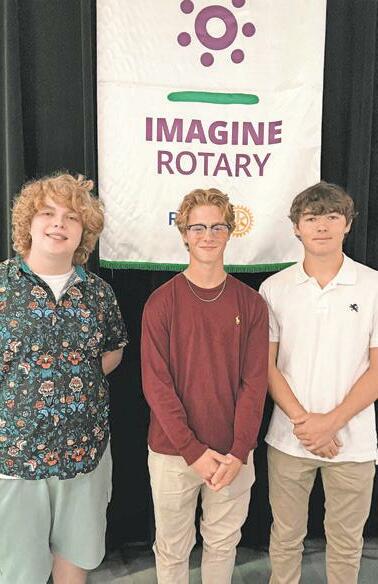


The Lawrence Schools Foundation honored as Student Champions: Evan White and Elijah Sabatini, FSHS seniors, and Jack Ritter and Anna Anderson, LHS seniors.


Kendra Fowlkes of Deerfield Elementary won Commerce Bank’s 50/50 Raffle at the Chamber’s Taste of Lawrence Mixer. She and the Lawrence Schools Foundation each received $715.
FSHS celebrates seniors Michael Bido, National African American and Hispanic Recognition Program Scholar, and Silvio Liu, National Hispanic Recognition Program Scholar.
The U.S. Department of State and the Fulbright Foreign Scholarship Board announced that Lisa Ball, an LHS science teacher, earned a Fulbright Global Classroom Teacher Award to conduct cuttingedge research, take part in a global education class and symposium, and receive an international classroom placement.
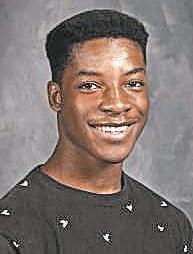

The Kansas Speech Communication Association recognized FSHS speech and debate coach Kelly Thompson as its Educator of the Year.
LHS celebrates seniors Arran Kennedy Orive, National Hispanic Recognition Program Scholar, and Ayo Obadare, National African American Recognition Program Scholar.
The Lawrence Lions Alumni Association inducted into its Hall of Honor Michael Gottlieb (Class of 1995), an attorney and partner at Willkie Farr & Gallagher, LLC, in Washington, D.C.; Brianne Pfannenstiel (Class of 2006), chief political reporter at the Des Moines Register; and David Platt, a retired 30year teacher and coach.